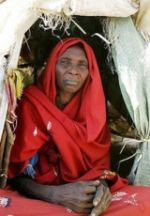Darfur settlement elusive as world marks Peace Day
September 21, 2007 (KHARTOUM) — A settlement to the conflict in the western Sudanese region of Darfur that has claimed thousands of lives and displaced at least two million people remained elusive as the world marked the International Day of Peace on 21 September.
 Peace Day coincides with a meeting in New York on Darfur (co-chaired by UN Secretary-General Ban Ki-moon and African Union (AU) Commission Chairman Alpha Oumar Konaré) aimed at assessing plans to deploy a joint UN-AU force of 26,000 in Darfur and putting the final touches to preparations for peace talks next month between Darfur rebels and Khartoum.
Peace Day coincides with a meeting in New York on Darfur (co-chaired by UN Secretary-General Ban Ki-moon and African Union (AU) Commission Chairman Alpha Oumar Konaré) aimed at assessing plans to deploy a joint UN-AU force of 26,000 in Darfur and putting the final touches to preparations for peace talks next month between Darfur rebels and Khartoum.
The latest efforts to end over four and a half years of conflict in Darfur have run into obstacles, as the participation of some influential rebel leaders in the talks due to take place in Libya on 27 October remains in doubt.
Abdel Wahid Mohammed al-Nur, founder of the Sudan Liberation Movement (SLM), who enjoys enormous support among Darfur’s displaced population, has set out a string of conditions he wants fulfilled before taking part.
Ahmed Abdel Shafie, leader of a faction of the SLM, has asked for a delay.
Khalil Ibrahim, leader of the Darfur-based rebel group Justice and Equality Movement (JEM), escalated its attacks on government forces in recent weeks, prompting a strong response that has further worsened security.
Nur’s participation
Nur wrote to the UN on 19 September outlining his conditions for participation in any negotiations with the government. “We should start any political process with providing security for our people first,” he said.
“There are severe human rights violations against our people on a daily basis by the Khartoum regime and its Janjawid militias,” said Nur.
The UN, he argued, should urge Khartoum to stop its bombardment of villages in Darfur, disarm the Janjawid militias, discontinue settling Arabs from neighbouring countries on land belonging to people forced to flee their homes, and end all other abuses against Darfuris.
“In our view, this will create a conducive environment for a peaceful political settlement,” he said.
Several attempts to persuade Nour to go to Libya and make his case at the negotiating table have failed so far.
Shafie
Abdel Shafie wants the negotiations rescheduled; saying conditions on the ground are unfavourable for talks and that more consultations are still needed.
“The SLM is of the opinion that the parties to the conflict in Darfur are not yet prepared to enter into genuine political negotiations. Under the circumstances, the timing of the forthcoming round of peace negotiations on Darfur. needs to be reconsidered,” he said.
“The parties need a few months of total calm in Darfur in order to prove their commitment to the new ceasefire arrangement. This would, in turn, create a situation of confidence and good will that could lead to viable political negotiations,” he added.
JEM’s Ibrahim
Meanwhile, JEM’s Ibrahim raised the stakes in a recent media interview. Unless he saw progress at the Libya talks, said Ibrahim, his group would demand an independent state in Darfur, a statement that has raised eye-brows in Khartoum.
A meeting of rebel representatives that Chad hosted this week to get them to unify their positions ahead of the peace talks ended with no major breakthrough.
The Darfur rebels have split into more than a dozen factions since a May 2006 deal that was signed by only one of three negotiating groups and rejected by the majority of Darfuris. The split has fuelled violence and banditry in the war-torn region.
“Violent scramble for power”
“The situation in Darfur has evolved from an armed conflict between rebels and the government into a violent scramble for power and resources involving government forces, Janjawid militia, rebels and former rebels, and bandits,” said the New York-based Human Rights Watch (HRW) in a report released on 20 September.
“But these complexities should not deflect attention from Khartoum ‘s responsibility for indiscriminate aerial and ground attacks, complicity in Janjawid attacks against civilians, failure to hold rights abusers accountable, and its unwillingness to establish a policing force that can protect civilians,” the report said.
HRW called on the UN Security Council, the AU and the international community “to impose targeted sanctions against the Sudanese government and other parties to the conflict if they fail to meet key benchmarks for improving the human rights situation in Darfur.”
It remains to be seen how many rebels groups will ultimately attend the talks.
(IRIN)
